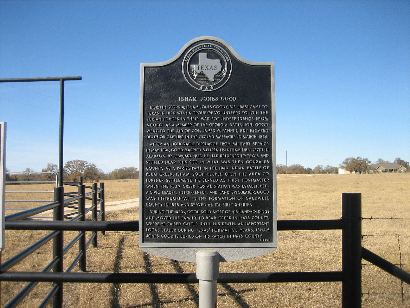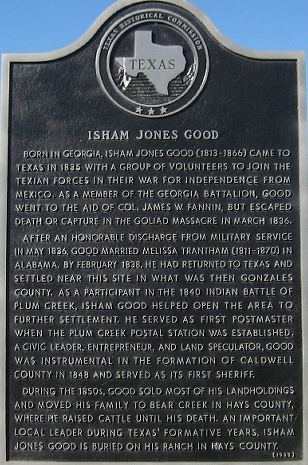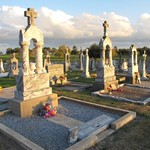Isham Jones Good. (original) (raw)

Historical marker for Isham Good and land where the cabin once stood
Photo courtesy Jeffery Robenalt, December 2010

Isham Jones Good Historical Marker
Photo courtesy Jeffery Robenalt, December 2010
See The Great Comanche Raid and Battle of Plum Creek by Jeffery Robenalt"...Further west, veteran frontier leaders like Matthew �Old Paint� Caldwelland Ben McCulloch were busy gathering the scattered volunteers at the cabin of Isham Good, one of only two settlers who were brave enough to settle in the remote area of central Texas. Good�s cabin stood a mile east of Plum Creek, near the road that led from Gonzales to the new capital of Austin.
If Buffalo Hump had led the war party west from Linnvilleand circled south of San Antonioon the return ride, the Comanches may well have escaped the trap being laid for them by the Texans. Instead, the war chief continued to lead his warriors to the northwest on the same trail the war party used to enter the Republic. The Comanches were heading straight into the arms of impending disaster.
Late in the afternoon of August 11, Jack Hays rode up to Isham Good�s cabin at the head of a company of Texas Rangers from San Antonio. The presence of the hardened veterans lifted the volunteers� spirits and helped bolster their confidence. However, Hays�s arrival was soon followed by General Felix Huston who rode in from Austin. Huston insisted that since he was a General in the regular Texas Army, he and not Caldwell, who had been selected by an earlier election of the men, should take command. Loud and angry protests immediately erupted from the volunteers.
Unlike General Huston, who was virtually unknown and had little experience in dealing with Indians, �Paint� Caldwell was a familiar figure to most men on the frontier, and a veteran of countless engagements with the Comanches. The Texans both knew and trusted him. However, in spite of the objections expressed by the volunteers, Caldwell felt Houston was entitled to take command, and the men reluctantly accepted his decision...." more
 |
|---|